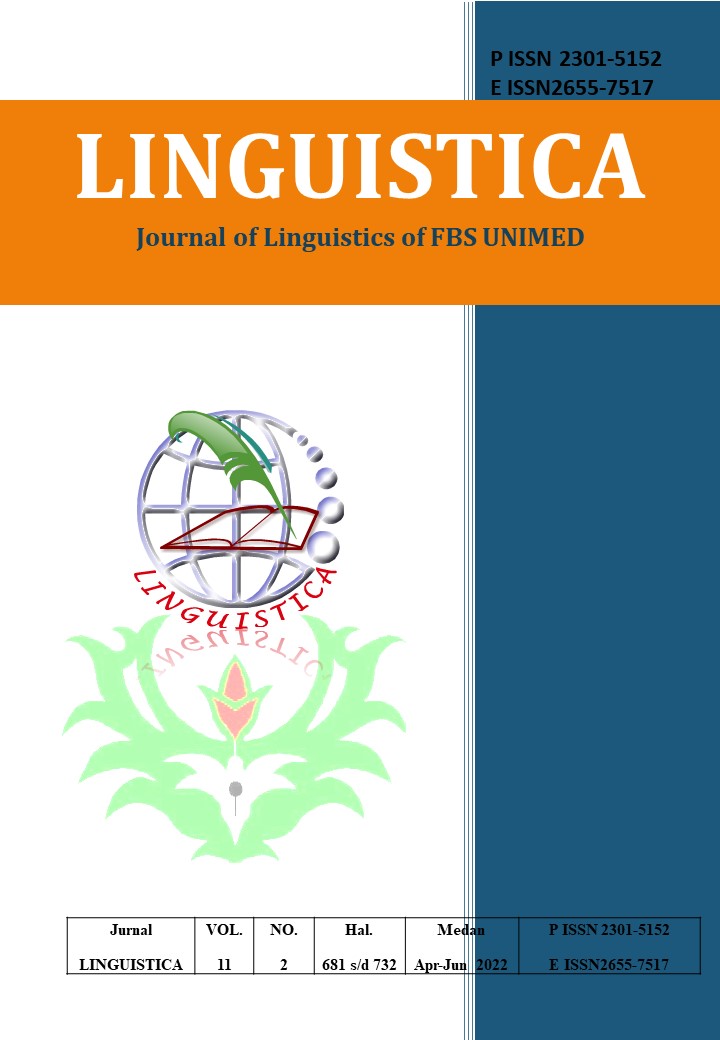DEVELOPING TEACHING MEDIA THROUGH POWTOON AS œTPACK (TECHNOLOGICAL PEDAGOGICAL CONTENT KNOWLEDGE) FOR SPEAKING SKILL AT GRADE 8 STUDENTS OF SMP N 2 BANGUN PURBA
DOI:
https://doi.org/10.24114/jalu.v11i2.37756Abstract
The objective of this study is to develop PowToon as media for teaching at Grade 8 students of SMP N 2 Bangun Purba in speaking transactional text. This research was conducted based on educational research and development (R&D) through six steps, namely: gathering data, analyzing data, designing media, validating by the expert, revising media, and final product. The Instrument of Collecting Data was questionnaire. The finding showed that one video of PowToon was used to teach English writing to Junior High School. The developed media PowToon had been validated by two experts and the average score has gotten was 85%. It was categorized œExcellent since that the developed to teaching media PowToon for speaking skills were suitable for the 8 grade students of SMPN 2 Bangun PurbaReferences
Asyhar. (2012). Development of Video Media Based on PowToon in Social Science. Indonesian:
International Journal of Educational Research Review.
Fimbriani. (2016). The Effect of Using PowToon on Learning English as a Foregn Language Media
Based on PowToon in Social Science. Indonesian: International Journal of Current Research. Vol.10, Issue, 05.
Frida. (Editor). (2009). The Function and Benefit of Learning Media.
https://educationlearning.wordpress.com/2009/01/16/function-and-benefits-of learning- media/.
Hadriana. (2008). Improving students™ speaking skill through communicative Activities in Small
Group Discussions at The Third Semester Class a of English Study Program of FKIP UNRI. Riau: Journal of English and Education.
Herawati, Rosa. (2019). The Developing of Learning Videos on PowToon-based Work and Energy
Topics to support Flipped Classroom Learning. Yogyakarta, Indonesia: IOSR Jurnal of Research and Method in Educational.
Ilham, Dio. (2021). Developing Teaching Media PowToon for Writing Descriptive Text at Grade 8
Students of SMPN 6 Percut Sei Tuan. Medan: Universitas Negeri Medan.
Maharani,R., Sudarsono., Arifin, Z. (2014). Teaching Transactional and Interpersonal Dialogues Using
Spontaneous Role Play. Pontianak: English Education Study Program of Tanjung Pura.
Matthew. (2014). The Technological Pedagogical Content Knowledge (TPACK): The Development
and Validation of Assessment Instrument for Preservice Teacher. Canada: ISTE (International Society for Technology in Education).
Megawati, Utami. (2020). English Learning with Powtoon Animation Video. Universitas Ganesha:
Journal of Education Technology.
Nura, Ulin. (2014). Transactional and Interpersonal conversation Texts in English Textbook. Pejaten:
STAIN Kudus.
Nura, Ulin. (2019). Compatibility of Transactional and Interpersonal Conversation Text in MTS
English Textbook with the Standart of Content. Pejaten: STAIN Kudus.
Surraya, Ayu. (2020). Tracing Technological content knowledge (TPACK) on Practical EFL Teachers
in Writing Content. Indonesia: VOLES (Voice of English Language Education Society)
Wirama, Ketut. (2019). PowToon for Teaching English in the second Grade. Universitas Pendidikan
Ganesha: International Journal of Language and Literature.
Yuliantini, Potu. (2021). The Use of PowToon as Media to Enhance EFL Student™ English Skill.
Ganesha University of Education Bali: Journal of Education studi
Downloads
Issue
Section
License
Copyright (c) 2022 Suci Jamiati, Nora Ronita Dewi

This work is licensed under a Creative Commons Attribution-ShareAlike 4.0 International License.
Authors who publish with this journal agree to the following terms:
- Authors retain copyright and grant the journal the right of first publication with the work simultaneously licensed under a Creative Commons Attribution License that allows others to share the work with an acknowledgment of the work's authorship and initial publication in this journal.
- Authors are able to enter into separate, additional contractual arrangements for the non-exclusive distribution of the journal's published version of the work (e.g., post it to an institutional repository or publish it in a book), with an acknowledgment of its initial publication in this journal.
- Authors are permitted and encouraged to post their work online (e.g., in institutional repositories or on their website) prior to and during the submission process, as it can lead to productive exchanges, as well as earlier and greater citation of published work (See The Effect of Open Access).
- This work is licensed under a Creative Commons Attribution-ShareAlike 4.0 International License.

